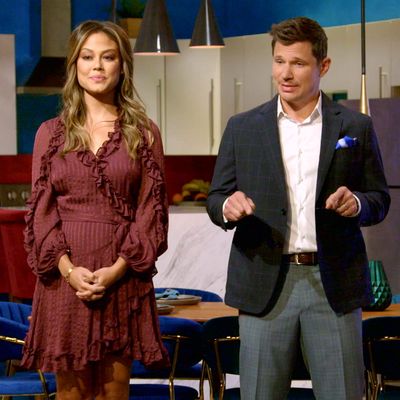
Love Is Blind, Netflix’s latest entry into trashy reality TV, comes out today. It’s a classic premise ramped up to enjoyably sloppy new heights, as explained by co-hosts Nick and Vanessa Lachey at the start of the first episode. “Welcome to the blind love experiment,” Nick says. “Here, you will choose someone to marry [incredibly long pause] without ever seeing them.”
This show won’t revolutionize reality TV, but it does raise an important question: What’s the bare minimum that you need to do to count as a reality-show host? Nick and Vanessa Lachey seem like hosts. There they are in the first episode, standing in front of a group of attractive people, explaining how this “experiment” works. They put on very serious faces and they say, “… is love blind?” At the end of each episode, there’s even a credit that reads “hosted by Nick and Vanessa Lachey.”
But it’s time to draw a line in the sand, a line that measures the bare minimum someone must do to function as the host of a reality show. Let’s call it the Chris Harrison Line. And let’s also agree that Nick and Vanessa Lachey absolutely do not qualify.
Reality show hosts have a variety of accepted roles, and whether or not you cross the Chris Harrison Line depends on whether you meet the needs of your specific reality subgenre. On some shows, the host participates significantly throughout the process: Survivor’s Jeff Probst, for instance, or Padma Lakshmi on Top Chef. In a competition reality show, the host often acts as a judge, or at least participates in the judging conversations. Some hosts might also act as a bridge between the contestants and the judges, like Ryan Seacrest does in every reality show he has ever hosted. And on reality shows where competition doesn’t involve a judges’ panel — shows like Love Island, Love Is Blind, or Netflix’s other recent reality series The Circle — a host often holds an important third-person narrator role, contextualizing or commenting on the action.
A host doesn’t need to be in every scene of a show, or even most of a show. There’s no hard-and-fast rule for how much screen time a host needs, or how much they have to interact with the contestants. This is why the Chris Harrison Line is a helpful standard: On The Bachelor, Chris Harrison is regularly absent. He does not oversee many of the dates. He rarely interacts with the contestants. Famously, his biggest job is to announce when there’s only one rose left, something anyone with even halfway decent eyesight would already know for themselves. The possibility of Chris Harrison looms over each season, but beyond rose ceremonies and Tell All specials, it’s hard to know when he’s going to pop in. He’s incidental to the proceedings, especially in the years since The Bachelor has decided it’s a series without unbreakable rules.
Nevertheless, if Chris Harrison left The Bachelor, you would know it immediately. His identity and the show’s identity have become permanently linked. If he left, The Bachelor could not continue without finding someone else to say, “This is the final rose tonight” and “Next up, the blooper reel!” Might someone else be a more involved reality host than Chris Harrison? Sure. But if you don’t meet the basic qualification of “this show would need to replace you if you left,” then you do not count as a reality host.
Now, let’s look at Nick and Vanessa Lachey on Love Is Blind. At first they seem like hosts. They stand in front of the assembled contestants and explain what’s about to happen. They greet the contestants. Sometimes, very rarely, they’ll even say a contestant’s name. That opening sequence in the first episode, though, where Nick and Vanessa walk out and gravely intone the important purpose of this experiment? That’s the high-water mark of their hosting duties.
At no point do they demonstrate knowledge of, or interest in, any specific detail about the contestants or the show. They do not deviate from their scripts. They do not express emotion. At one point Nick asks a contestant a single question, but then declines to respond or react to the answer in any way. Their role of explaining the show’s premise could be easily replaced by some explanatory title cards, a little note for the contestants to read aloud, or cardboard cutouts of Nick and Vanessa Lachey with speech bubbles attached to their mouths.
The Chris Harrison Line should not be measured by a strict quantitative count of screen time, but it’s still worth noting in this case. Love Is Blind is 10 episodes long and each episode is about an hour. In total, Nick and Vanessa Lachey appear for a whopping 13 minutes, an average of less than 90 seconds per episode. They do not appear in the finale. They do not engage with the end of the show in any way.
Love Is Blind eventually winds its way into becoming a compelling show, and I would happily watch a second season. But if you see Nick and Vanessa Lachey out on the publicity circuit promoting this show and describing themselves as hosts, do not believe them. Like not-that-Mark-Walberg on Antiques Roadshow and Carson Daly on The Voice, they do not cross the Chris Harrison Line.


